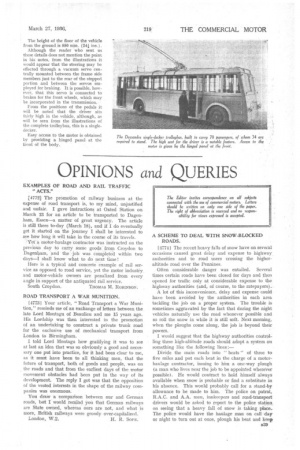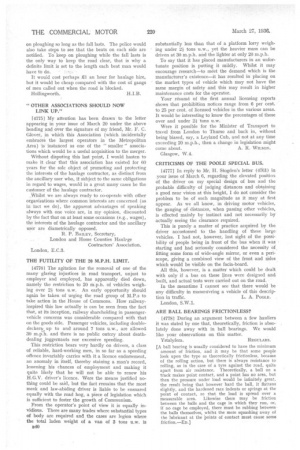OPINIONS and
Page 53

Page 54

If you've noticed an error in this article please click here to report it so we can fix it.
UERI ES
EXAMPLES OF ROAD AND RAIL TRAFFIC "ACTS?'
{47721 The promotion of railway business at the expense of road transport is, to my mind, unjustified and unfair. I gave instructions at Oxted Station on March 13 for an article to be transported to Dagenham, Essex—a matter of great urgency. The article is still there to-day (March 18), and if I do eventually get it started on the journey I shall be interested to see how Icing it will take in the course of its travels. .;Yet'a motor-haulage "contractor was instructed on the previous day to carry some goodsfrom Croydon to Dagenham, -p.nd thejob was completed within two days—I shall know what to do next time !
Here is a typical and concrete example of rail service as opposed to road service, yet the motor industry, and motor-vehicle owners are penalized from every angle in support of the antiquated rail service.
South Croydon. TnomAs M. ROBINSON.
ROAD TRANSPORT A WAR MUNITION.
[47731 Your article, "Road Transport a War Munition," reminds me of an exchange of letters between the late Lord Montagu of 13eaolien and me 15 years ago. His Lordship was then interested in the promotion of an undertaking to construct a private trunk road for the exclusive use of mechanical transport from London to Birmingham.
I told Lord Montagu how gratifying it was to see at last an idea that was so obviously a good and necessary one put into practice, for it had been clear to me, as it must have been to all thinking men, that the future of transport, both of goods and people, was on . the roads and that from the earliest days of the motor movement obstacles had been put in the way of its development. The reply I got was that the opposition of the vested interests in the shape of the railway companies was enormous.
You draw a comparison between our and German roads, but I. would remind you that German railways are State owned, whereas ours are not, and what is more, British railways were grossly over-capitalized..
London, W.2. ff. R. SOFE. A SCHEME TO DEAL WITH SNOW-BLOCKED ROADS.
[4774] The recent heavy falls of snow have on several occasions caused great delay and expense to highway authorities and to road users crossing the higheraltitude road over the Pennines.
Often considerable danger was entailed. Several times certain roads have been closed for days and then opened for traffic only at considerable expense to the highway authorities (and, of course, to the ratepayers).
A lot of this inconvenience, delay and expense could have been avoided by the authorities in each area tackling the job on a proper system. The trouble is sometimes aggravated by the fact that during the night vehicles naturally use the road whenever possible and so roll the snow in while it is still soft. Next morning, when the ploughs come along, the job is beyond their powers.
I would suggest that the highway authorities controlling these high-altitude roads should adopt a system on something like the following lines:—
Divide the main roads into " beats " of three to five miles and put each beat in the charge of a motorhaulage contractor, issuing to him a one-way plough (a man who lives near the job to be appointed wherever possible). He would contract to hold himself always available when snow is probable or find a substitute in his absence. This would probably call for a stand-by allowance to be made to him. The police on patrol, R.A.C. and A.A. men, innkeepers and road-transport drivers would be asked to report to the police station. on seeing that a heavy, fall of snow is taking place., The police would have the haulage man 'on call. day or night to turn out at once, plough his beat and keep
on ploughing so long as the fall lasts. The police would also take steps to see that the beats on each side are notified. To keep on ploughing while the fall lasts is the only way to keep the road clear, that is why a definite limit is set to the length each beat man would have to do. • • It would cost perhaps £1 an hour for haulage hire, but it would be cheap compared with the cost of gangs of men called out when the road is blocked.
Hollirtgworth. H.I.B.
41 OTHER ASSOCIATIONS SHOULD NOW LINK UP."
[47751 My attention has been drawn to the letter appearing in your issue of March 20 under the above heading and over the signature of my friend, Mr. F. C. Glover; in which this Association (which incidentally embraces the largest operators in the Metropolitan Area) is instanced as one of the " smaller " associations which would be a useful acquisitionto the merger.
Without disputing this last point. I would hasten to make it clear that this .association has existed for 60 years for the sole object of promoting and protecting the interests of the haulage contractor, as distinct from the ancillary user who, if subject to the same obligations in regard to wages, would in a great many cases be the customer of the haulage contractor.
.Whilst we are always ready to co-operate with other organizations where common interests are concerned (as in tact we do), the apparent advantages of speaking always with one voice are, in my opinion, discounted by the fact that on at least some occasions (e.g., wages), the interests of the haulage contractor and the ancillary user are diametrically opposed.
H. P. BAILEY, Secretary, London and Home Counties Haulage Contractors' Association. London, E.C.3.
THE FUTILITY OF THE 20 M.P.H. LIMIT.
[47761 The agitation for the removal of one of the many • glaring injustices in road transport, unjust to employer and employed, has apparently died down, namely the restriction to 20 m.p.h. of vehicles weighing over 24tons u.w. An early opportunity should again be taken of urging the road group of M.P.s to take action in the House of Commons. How railwayinspired this law actually is can be seen from the fact that, at its inception, railway shareholding in passengervehicle concerns was considerable compared with that on the goods side. Passenger vehicles, including doubledecker... up to and around 7 tons u.w., are allowed 30 m.p71a. and there is no public outcry about deathdealing juggernauts nor excessive speeding.
This restriction bears very hardly on drivers, a class of reliable, hard-working men, in so far as a speeding offence invariably carries with it a licence endorsement, an anomaly in itself, thereby staining a man's record, lessening his chances of employment and making it quite likely that he will not be able to renew his H.G.V. driver's licence. Were the means justified nothing could be said, but the fact remains that the most meek and law-abiding driver is liable to be ensnared equally with the road hog, a piece of legislation which is sufficient to foster the growth of Communism.
From the operator's point of view it is equally invidious. There are many trades where substantial types of body are required and the cases are legion where the total laden weight of a van of 3 tons u.w. is B40 substantially less than that of a platform lorry weighing under 2itons u.w., yet the heavier mass can be driven at 30 m.p.h. and the lighter at only 20 m.p.h.
To say that it has placed manufacturers in an unfortunate position is putting it mildly. Whilst it may encourage research—to meet the demand which is the manufacturer's existence—it has resulted in placing on the market types of vehicle which may not have the same margin of safety and this may result in higher maintenance costs for the operator.
Your r6sume of the first annual licensing reports . shows that prohibition notices range from 6 per cent. to 25 per cent. of licensed vehicles in the various areas. It would be interesting to know the percentages of those over and under 2i. tons u.w.
Were it possible for the Minister of Transport to travel from London to Thurso and back in, without being biased, say, a Leyland Cub, and not at any time exceeding 20 m.p.h., then a change in legislation might
come about. A. R. WILSON. Glasgow, W.4.
CRITICISMS OF THE POOLE SPECIAL BUS.
L47771 In reply to Mr. II. Stogden's letter (4761) in your issue of March 6, regarding the elevated position of the driver on my special design of bus and the probable difficulty of judging distances and obtaining a good near vision at this height, I do not consider the problem to be of such magnitude as it may at first appear. As we all know, in driving motor vehicles, the gauging ofdistances, when passing other vehicles, is effected mainly by instinct and not necessarily by actually seeing the clearance required.
This is purely a matter of practice acquired by the driver accustomed to the handling of these large vehicles. I had not, however, lost sight of the possibility of people being in front of the bus when it was starting and had seriously considered the necessity of fitting some form of wide-angle mirror, or even a periscope, giving a combined view of the front and sides , which would be visible on the facia-board.
All this, however, is a matter which could be dealt with only if a bus on these lines were designed and built, and actual tests were carried out on the road. •
In the meantime I cannot see that there would be any difficulty in mancettvring a vehicle of this descrip
tion in traffic. L. A. POOLE. London, S.W.1.
ARE BALL BEARINGS FRICTIONLESS?
147781 During an argument between a few hauliers it was stated by one that, theoretically, friction is absolutely done away with in ball bearings. We would like your observations on this matter.
Ystalyfera. REGULARS.
[A ball bearing is usually considered to have the minimum amount of friction, and it may be that some people look upon the type as theoretically frictionless, because of the rolling action, but there is always resistance to rolling, as in the case of a tyre against the road, quite apart from air resistance. Theoretically, a ball on a track makes point contact, and a point has no area, but then the pressure under load would be infinitely great, the result being that however hard the ball, it flattens slightly, and the hardened race indents or springs at the point of contact, so that the load is spread over a measurable area. Likewise there may be friction between the balls and the cage in which they run, or, if no cage be employed, there Must be rubbing between the balls themselves, whilst the mere squashing away of the lubricant at the Points of contact must cause some friction.—En.)




























































































